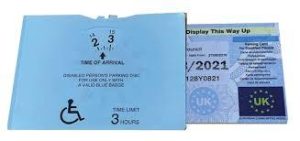A disabled man from North London claims he was told to ‘make the most of his independence’ as he would ‘end up in a wheelchair’ whilst being assessed to renew his blue badge – something he was then rejected for. Despite the man complaining that his condition had got worse over time, Harrow Council decided he ‘did not meet the mobility criteria’ for a blue badge.
The Local Government Ombudsman (LGO) investigated claims that Harrow Council’s decision was wrong. The man, referred to in the LGO report as Mr B, also complained that the assessor was rude to him by making inappropriate comments.
According to the report, Mr B had made an application to Harrow Council to renew his blue parking badge when his current one was set to expire. In his application, Mr B stated that he had a hidden disability and problems with walking. He explained that he walks with a limp and drags his feet, which, over long distances, usually causes his knees to buckle and he loses his balance.
Mr B claimed that the issues have caused him to have three falls within the last year, as well as a number of other ‘near misses’. He stated that the risk of falling causes him to feel ‘anxious to go out’ as he feels unstable and suffers with fatigue. A letter from his consultant noted that, whilst he had ‘a steady gait’, he did have a tendency to ‘suddenly drop on one side’.
Mr B was required to undergo an assessment with the council’s independent mobility assessor. The assessor’s report highlighted that Mr B walked slowly with a limp, dragged one foot, and stopped three times due to knee pain. It also found that he had ‘mild instability’ when using outdoor steps with a rail. Harrow Council subsequently decided that Mr B ‘did not meet the mobility criteria’ for a blue badge, which he claims has meant he ‘struggles to get to the shops and appointments’.

The Blue Badge Scheme is an initiative by the Department for Transport (DfT) designed to help people with severe mobility problems that affect their ability to access essential goods and services – such as food shopping or attending doctors’ appointments. However, councils are responsible for the day-to-day administration of the scheme, which includes assessing eligibility.
Applicants who can walk more than 80 metres and do not display considerable difficulty walking for any other reason, including very considerable psychological distress, or serious risk to themselves or others, would not be eligible. The guidance is non-statutory, meaning councils do not have to follow it, but most do.
Mr B claims he had to stop during the physical assessment due to fatigue, which he described as ‘overwhelming and debilitating’, rather than pain and the assessor had not taken the impact of this into consideration.
Harrow Council rejected the appeal, citing ‘no evidence of recurrent or unexplained falls’. The appeal document states that Mr B provided information about near miss falls, but the LGO pointed out that it makes no mention of the fact that he had told the council that he had fallen three times in the previous year.
The council explained to the LGO that it considered the accounts of the falls but ‘there was no medical evidence’ – such as hospital reports or the involvement of healthcare professionals – and it takes ‘a balanced approach’ to an applicant’s self-reported reasons.
In response to Mr B’s complaints about the assessor’s conduct, the council told the LGO that the comment was considered as part of the appeal process. It claimed that it had not investigated it fully as the assessment happened ‘some month ago’ and they no longer work with the organisation. The LGO said Harrow Council was at fault as it had not given any information to show that it did this but accepted that it would not be possible to fully investigate it now.
The LGO said: “I can see that Mr B was distressed and upset by the remark, and he wanted to raise it with the council, but an investigation now is unlikely to establish what happened, nor achieve any worthwhile remedy.”
The Ombudsman is not an appeal body, meaning it does not take a second look at a decision to decide if it was wrong. Instead, it looks at the processes an organisation followed to make its decision. If it considers it followed those processes correctly, the LGO cannot question whether the decision was right or wrong.
The LGO said: “The council’s shortcomings have caused Mr B uncertainty as to whether the council decided his appeal properly. Sometimes we will recommend that a council review its decision, ensuring that it takes into account all the information.
“However, the council has considered Mr B’s situation fully in response to my investigation and it has taken into account the medical information and the observations of the assessor. This means it is very unlikely that a further review would mean the council approves Mr B’s application for a blue badge, and so I have not recommended the council do this.”
Harrow Council was approached for comment but did not respond ahead of publication.




